Better Than Most is a regular feature of The Business of Giving, examining the best places to work among social good businesses and nonprofit organizations.
Denver: And this evening, we’ll be taking a drive up to Clinton, New York, one hour east of Syracuse and to the beautiful campus of Hamilton College. We’ll begin the segment with my daughter, Andrea, a 2011 graduate of the college, speaking with their president David Wippman. And they’ll be followed by members of the Hamilton faculty and staff.
Andrea: How would you describe the organizational culture at Hamilton?
David: I’ve been here just a little over a year, and when I was learning about the community, that’s the word that kept coming up. This is a real community. That’s how I describe the organizational culture. People really care for each other here at the college.
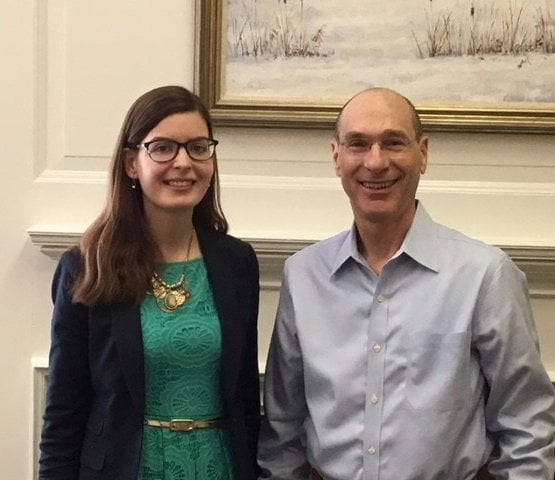
Andrea Frederick and David Wippman
Dick: When we’re hiring, we now take along a laptop with a series of pictures of the space, and when we’re talking to a job candidate and say, “Here’s what it looks like.” And you can see a picture from inside a faculty member’s office with the faculty person sitting there… several students sitting across the desk. And in the background, you can see out the door, and there are 10 people outside the door, too. You look at the face, and some people look at that and say, “Are you crazy? Who would want to do that?” The people that we hire are the people who look at that and say, “That’s where I want to be. That’s what I’m going to be doing.”
Phyllis: I have this world-famous recipe for fried chicken that I can do like no other. I’m allowed to go into the dining hall and fry that chicken and prepare it so people can share. The back part of that is: I just simply love the fact that everybody knows my name. I can walk across this campus and get a hug and get a hello from people who call me by name and acknowledge that I’m here. To me, that’s a real perk.
Vige: I have a lot of interface with faculty and students, but one of the opportunities that I have that I really, really enjoy is the international host family program that I participate in every year. Almost since I came here in 2002, I’ve “adopted” a student or students. I usually stay in touch with these students. So now I have alumnae families in Turkey and China and Luxembourg and France and all over the world. Whenever I get a new student, I call upon my graduated students to e-mail that student and tell them what to bring and how to prepare, and it’s their responsibility…what to order from Amazon. It creates a network, and they start helping each other.
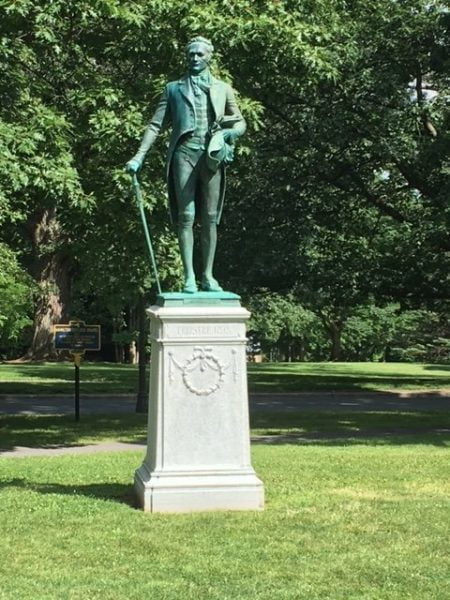 Stuart: At any rate, from the day I got here, I’ve been proud to be a part of this faculty. Frankly, pretty much in awe of everyone I’ve ever worked with – at times overwhelmingly so. But to see the impact that my colleagues have had on my children, and the impact of a Hamilton education on my children…now, I love my colleagues. I’m grateful for them in ways that I… sometimes… I hope there’s some parent out there that feels that way about me. Having some kind of impact on your kid, because I’ve seen it three times over now. And talk about blessing!
Stuart: At any rate, from the day I got here, I’ve been proud to be a part of this faculty. Frankly, pretty much in awe of everyone I’ve ever worked with – at times overwhelmingly so. But to see the impact that my colleagues have had on my children, and the impact of a Hamilton education on my children…now, I love my colleagues. I’m grateful for them in ways that I… sometimes… I hope there’s some parent out there that feels that way about me. Having some kind of impact on your kid, because I’ve seen it three times over now. And talk about blessing!
Patty: One of the things that makes me happy and feel so grateful to be a part of this community is just the sheer fact that one of my graduates, Catie Gibbons, shoots me a text message the other day telling me that they’re moving her little brother into Hamilton tomorrow. He’s coming in as a new freshman and wants to know if I’m around and she and her dad want me to come find them, and that just makes me so giddy and proud that we’re in a relationship with so many people like that.
Marianne: My favorite perk that I want to talk about is actually the free spot in the cemetery, which when I tell people about this, they are always just blown away.
So you look at the map and you’re like, “Oh, I’ll be over by so and so. I’m sure she’ll have a really cool statue, so people will come over and visit me.” I joke with my students about that, and they say, “When you come back for reunion, you can come visit me over by the Truax pillars. Have a drink, have a toast, read some Kant or something in honor of me.” So that’s my favorite perk.
David: This is the place where Samuel Kirkland, who founded the Hamilton-Oneida Academy, which was the predecessor of Hamilton College back in 1793… That’s where he would greet students. Now we’re greeting the students as they come in to sign the register. You tell me, but to me it’s a really moving moment. You’re inscribing your name in the book of the college, and you’re connecting with that 206-year history, and you’re also looking to that community going forward.
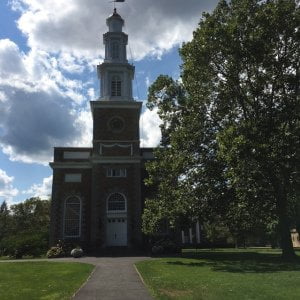 Stuart: But Hamilton’s history, certainly the modern history, is absolutely stunning compared to almost anywhere else. It is this insane combination of the old stuffed shirt, men’s campus on one side, and the raging liberal female campus on the other side. What we’ve got here is hormonal balance. It’s just fabulous, and it took the best of both of those perspectives and rolled it into one ball, and that is what everybody here benefits from every single day.
Stuart: But Hamilton’s history, certainly the modern history, is absolutely stunning compared to almost anywhere else. It is this insane combination of the old stuffed shirt, men’s campus on one side, and the raging liberal female campus on the other side. What we’ve got here is hormonal balance. It’s just fabulous, and it took the best of both of those perspectives and rolled it into one ball, and that is what everybody here benefits from every single day.
Patty: This is a co-curricular education where so many different people are going to challenge you and literally put a mirror in front of your face so that you also educate yourself and gain some kind of self-awareness, which I don’t think you can get in any textbook or from any specific person other than you wanting to own that yourself. I know that this college presents those opportunities to our students and it’s just wonderful to be a part of that and also be the beneficiary of that because I know that I have grown as a professional and as a person in this community because of my colleagues and the students and just living where I live on College Hill. It’s absolutely a blessing to be a part of it.
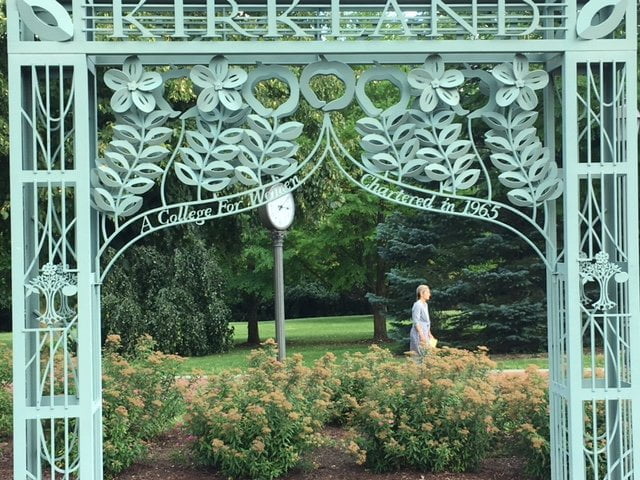
Marianne: I’ve taught in many places, and I’ve formed attachments to students in all those places, but there has been just something particularly… I don’t know… connected between me and Hamilton students. I don’t know if that’s partly because we have sort of an informal culture here, and so we make these bonds really easily… and the college encourages that, or if it’s just these students. I don’t know. It could be both.
Mike: We had the idea that we would take these students down to the National Press Club, and they would actually present their research in front of…We invited the media and the like, and there was no question of the college… we’d come up with the resources and we would do this kind of thing for the students. It just kind of epitomizes for me the opportunities that students have, and things that fit with the culture of the institution.
Phyllis: I consider that a true testament to the movement of inclusion and diversity here on this campus, and the fact that it’s so present, but then so not, because we do a fantastic job of including folks and making room. When I started here, the student of color population was 0.3%. There were 12 of us. And now we’re at 30%. I take that as a personal commitment to me, and the fact that this institution makes room. That’s my story.
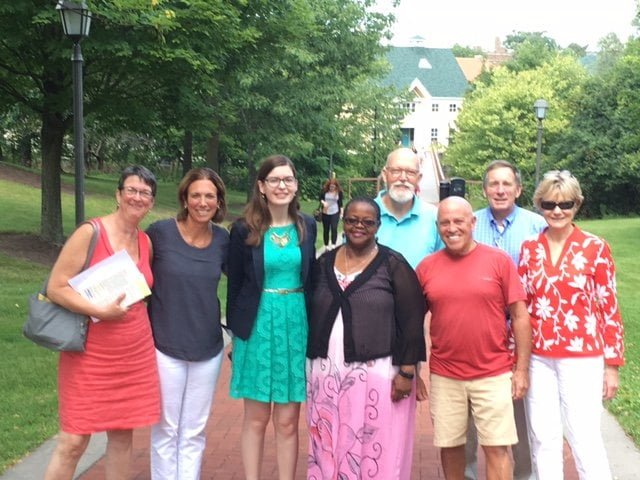
Denver: I want to thank all those who participated in this piece: Richard Bedient, Marianne Janack, Stuart Hirshfield, Phyllis Breland, Patty Kloidt, Vige Barrie, and Mike Debraggio. You can listen to this podcast again, read the transcript and see pictures of the participants and the Hamilton campus simply by going to denverfrederick.wordpress.com. And while you’re there, check out the link to my full interview with David Wippman, the president of Hamilton College.
The Business of Giving can be heard every Sunday evening between 6:00 p.m. and 7:00 p.m. Eastern on AM 970 The Answer in New York and on iHeartRadio. You can follow us @bizofgive on Twitter, @bizofgive on Instagram and at http://www.facebook.com/BusinessOfGiving

